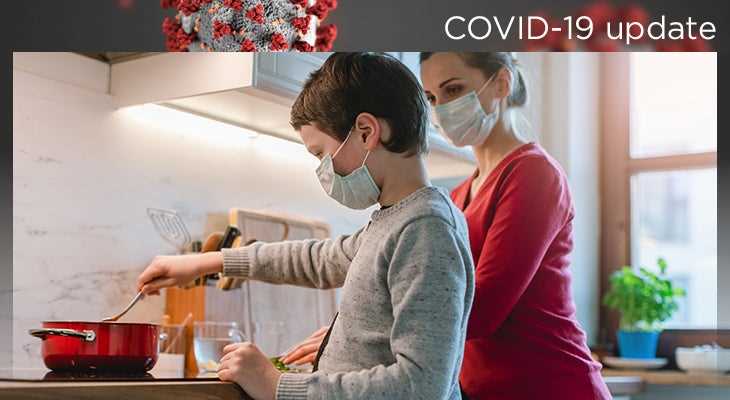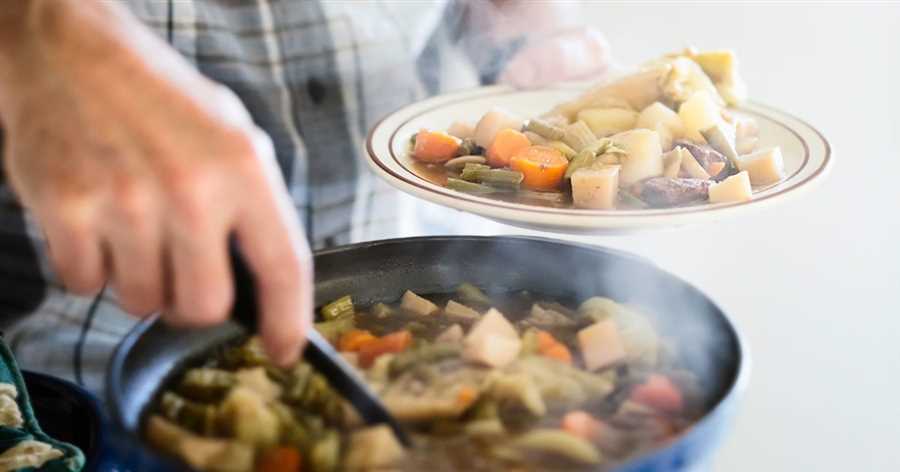COVID-19, also known as the coronavirus disease, has affected almost every aspect of our lives. It has changed the way we work, socialize, and even the way we eat. As the world continues to battle this global pandemic, many people are concerned about the safety of cooking and preparing food while being infected with COVID-19.
The good news is that cooking with COVID-19 is still possible, but it is crucial to follow proper safety protocols to minimize the risk of spreading the virus. According to the World Health Organization (WHO), the virus primarily spreads through respiratory droplets when an infected person coughs, sneezes, talks, or breathes heavily. It is important to note that there is currently no evidence that COVID-19 can be transmitted through food or its packaging.
However, it is essential to maintain good hygiene practices while cooking, especially if you are infected or have been in close contact with someone who has COVID-19. This includes washing your hands frequently with soap and water for at least 20 seconds, cleaning and disinfecting surfaces, utensils, and kitchen equipment, and avoiding touching your face, mouth, or eyes while cooking.
If you are preparing food for others while infected with COVID-19, it is recommended to wear a mask, practice social distancing in the kitchen, and avoid handling food directly with your hands. Instead, use utensils or gloves to minimize the risk of contamination.
Precautions when cooking with covid

When cooking while having COVID-19, it is important to take extra precautions to ensure the safety of yourself and others. Here are some guidelines to follow:
1. Isolate yourself
If you test positive for COVID-19, it is crucial to isolate yourself and avoid any contact with others. This applies to cooking as well. Make sure you cook in a well-ventilated area, preferably with the window open, to minimize the risk of transmission.
2. Practice good hygiene
Wash your hands thoroughly with soap and water for at least 20 seconds before and after preparing food. This will help reduce the risk of spreading the virus. Additionally, make sure to clean and disinfect any utensils, cutting boards, and surfaces that come into contact with the food.
3. Use personal utensils
Avoid sharing utensils, dishes, or any other kitchenware with others. It is recommended to use your own personal set of utensils and plates to minimize the risk of contamination.
4. Cook at the right temperatures
When cooking with COVID-19, it is important to cook food at the proper temperatures to kill any potential virus present. Use a food thermometer to ensure that meat, poultry, and other perishable foods are cooked to the recommended internal temperature.
Remember: Cooking with COVID-19 should only be done if absolutely necessary. It is highly advised to seek medical advice and avoid cooking for others until you have fully recovered and tested negative for the virus.
Stay safe and take all necessary precautions to protect yourself and others from the spread of COVID-19.
Recipes to try when you have covid
During the period of self-isolation, having COVID-19 doesn’t mean you have to compromise on the taste and nutrition of your meals. Here are a few simple and easy recipes to try while you recover from COVID-19.
1. Chicken Vegetable Soup
This nourishing soup is packed with vitamins and minerals to help boost your immune system. To make it, sauté diced chicken, onions, and garlic in a pot. Add chopped vegetables like carrots, celery, and bell peppers. Pour in chicken broth and bring it to a boil. Simmer until the vegetables are tender. Season with salt, pepper, and fresh herbs of your choice.
2. Ginger Garlic Turmeric Tea
This soothing tea is known for its anti-inflammatory properties. Boil water and add fresh ginger slices, crushed garlic, and a pinch of turmeric. Let the flavors infuse for a few minutes. Strain and add honey and lemon to taste. Drink it warm to ease congestion and sore throat.
3. Smoothies
Smoothies are a great way to consume essential nutrients when you have a reduced appetite. Blend together fruits like bananas, berries, and mangoes with a liquid base such as milk or yogurt. Add a handful of spinach or kale for an extra dose of vitamins. You can also add protein powder or nut butter for added energy.
4. Baked Salmon with Quinoa
This healthy and delicious dish is rich in omega-3 fatty acids and protein. Season salmon fillets with herbs, lemon juice, and olive oil. Place them on a baking sheet lined with parchment paper and bake in the oven until cooked through. Serve with cooked quinoa and steamed vegetables for a complete meal.
5. Banana Oat Pancakes
These pancakes are a great option for a nutritious breakfast. Mash ripe bananas and mix them with oats, milk, and a pinch of cinnamon. Let the batter rest for a few minutes. Heat a non-stick pan and pour the pancake batter. Cook until golden brown on both sides. Serve with honey or maple syrup.
Remember to consult your healthcare professional before making any significant dietary changes during your recovery from COVID-19. Stay hydrated and eat a balanced diet to aid in your healing process.
Benefits of cooking while being infected with covid
While battling an infection like Covid-19 can be challenging, there are several benefits to cooking during this time:
- Boosting your immune system: When you’re infected with Covid-19, it’s crucial to support your immune system. Cooking your own meals allows you to choose nutritious ingredients that can help strengthen your immunity.
- Controlling your diet: Cooking at home gives you control over what you eat, allowing you to avoid processed foods and focus on a balanced diet. This can aid in managing symptoms and promoting overall well-being.
- Therapeutic effects: Engaging in activities like cooking can have therapeutic effects on the mind and body. It can provide a sense of accomplishment, reduce stress, and serve as a distraction from illness-related concerns.
- Enhancing taste and enjoyment: When you cook your own meals, you have the freedom to experiment with flavors and spices. This can enhance the taste of your food and make your meals more enjoyable, especially when dealing with the loss of taste or smell that can occur with Covid-19.
- Preventing food waste: Cooking your own meals allows you to use ingredients wisely and avoid food waste. This can be especially helpful during times when access to groceries might be limited or when you may not have the energy to go shopping frequently.
It’s important to note that while cooking can have numerous benefits, it’s essential to prioritize your health and rest when needed. If you’re too fatigued or experiencing severe symptoms, it’s advisable to seek help or rely on others for cooking meals. Always follow the guidelines provided by healthcare professionals and take necessary precautions to prevent the spread of Covid-19.
Tips for cooking safely with COVID
During the COVID-19 pandemic, it’s important to take extra precautions when cooking to ensure the safety of yourself and those around you. Here are some tips to help you cook safely during this time:
- Wash your hands thoroughly before and after handling any food or utensils. Use soap and water to wash your hands for at least 20 seconds.
- Wear a mask and gloves while cooking to prevent the spread of the virus.
- Clean and sanitize all surfaces, utensils, and equipment before and after use. Use hot, soapy water or a suitable disinfectant.
- Avoid touching your face, nose, or mouth while cooking. This will help reduce the risk of contamination.
- Keep a safe distance from others in the kitchen. If possible, cook alone or limit the number of people in the cooking area.
- Follow proper food handling and storage guidelines to prevent foodborne illnesses. Ensure that meats and other perishable items are stored at the correct temperature.
- Avoid sharing utensils, plates, or glasses with others. Use disposable or individual serving utensils when possible.
- If you are feeling unwell or experiencing any COVID-19 symptoms, avoid cooking for others. It’s important to prioritize your health and the safety of others.
By following these tips, you can help reduce the risk of spreading COVID-19 while cooking and ensure the safety of yourself and your loved ones.
Foods to avoid when cooking with covid
When cooking with Covid, it is important to be mindful of the foods you choose to consume. Certain foods can have negative effects on your immune system and overall health, making it crucial to avoid them during this time.
1. Processed foods
Avoid consuming processed foods as they often contain additives, preservatives, unhealthy fats, and high levels of salt and sugar. These ingredients can weaken your immune system, making it harder for your body to fight off the virus.
2. Sugary snacks and beverages
Sugary snacks and beverages can increase inflammation in the body, which can further weaken your immune system. Replace these items with healthier options such as fruits, vegetables, and herbal teas.
3. Greasy and fatty foods
Greasy and fatty foods can be heavy on the digestive system, making it harder for your body to focus on fighting the virus. Opt for lighter and healthier cooking methods such as baking, steaming, or grilling your meals.
4. Alcohol
Consuming alcohol can suppress your immune system and dehydrate your body, making it less effective in fighting infections. It is best to avoid alcohol altogether during this time and focus on staying hydrated with water or herbal teas.
5. Caffeine

Although caffeine can provide a temporary energy boost, it can also dehydrate your body and affect your sleep quality. Limit your consumption of caffeinated drinks to maintain a healthy immune system.
By avoiding these foods and focusing on a balanced diet that includes fruits, vegetables, lean proteins, and whole grains, you can support your immune system and overall health while cooking with Covid.
Questions and answers
Can I cook if I have COVID-19?
If you have COVID-19, it is best to avoid cooking as it can pose a risk of spreading the virus to others. It is important to isolate yourself and let someone else handle the cooking to minimize the risk of transmission.
Can I cook if I tested positive for COVID-19 but have no symptoms?
Even if you are asymptomatic, it is still recommended to avoid cooking if you have tested positive for COVID-19. Asymptomatic individuals can still spread the virus to others, so it is best to let someone else handle the cooking to reduce the risk of transmission.
What precautions should I take if I need to cook while having COVID-19?
If you absolutely need to cook while having COVID-19, there are some precautions you can take. Make sure to wear a mask, wash your hands frequently, and sanitize all surfaces and utensils thoroughly. It is also important to avoid close contact with others and maintain social distancing while cooking.
Can I order takeout if I have COVID-19?
If you have COVID-19, it is best to avoid ordering takeout to minimize the risk of spreading the virus to others. It is recommended to rely on someone else for food delivery or cooking while you are in isolation.






